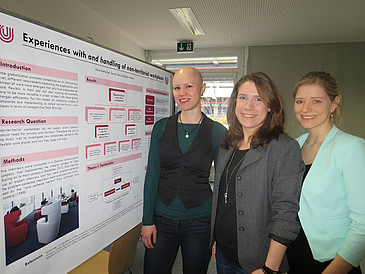A chance to exchange views and discuss research projects with fellow Master students and instructional staff from the USA, Australia, England and Denmark. This week students on the University of Bremen‘s Master Program “Industrial Psychology” were able to take advantage of such an opportunity. Within the frame of a five-day conference titled “Work, Identity and Globalization” they presented the research projects they have been working on for the past two semesters.
The common denominator is the thematic area “Work and Identity Development”. This is the fourth time the team led by Prof. Birgit Volmerg, professor for work and organizational psychology in the Faculty of Human and Health Sciences has organized the event.
Intensive exchange in a small circle of experts
It is a relatively small circle comprising 28 students and 14 international academics that came together every day in the GW2 building. “This gave us a great opportunity to present our projects and hold discussions in small work groups”, says Master student Michelle Weise. This is the first time the 22-year-old attended an event held in English. The time just flew by. “Being able to exchange views with international academics is an enriching experience”, adds her fellow student, Nina Hentschel.
Project example: When two people (have to) share a work station
Together with her fellow student Sarah Hertz she worked on a research project that investigated how office workers cope with having to share a work station. The students held interviews with four such persons and an expert inside a company that practices sharing work stations. “We hit on the idea when talking to someone we know who has experience of it”, explains Sarah Hertz.
The persons involved view the situation with some ambivalence. While accepting the loss of their own personally influenced work station, they still feel resentment when it is frequently occupied by other colleagues. Beside the emotional level, the interviewees identify two main problems: It is more difficult to fulfill leadership roles due to the lack of personal contact. Moreover, working in an open space office calls for more self-discipline so as not to disturb the work of others with one’s personal matters.
“On the positive side, the more flexible working time, sometimes even involving withdrawal to the home office when extremely high levels of concentration are called for, is quite welcome”, says Sarah Hertz. Variable working times permit a certain degree of freedom for self-organization.
Another team investigated the world of banking
Another five-person team carried out several investigations on the effects of the financial crisis on uninvolved banks and their customers. Taking a local bank as example, they investigated the bank’s outward projection on the basis of video clips on Youtube. Their conclusion: “Prior to the crisis the bank presented itself in a sort of “hero” role. Once the crisis took hold, they adapted this to a “mother” role. “Interestingly, following the outbreak of crisis the video clips became more down-to-earth and businesslike in order to set the bank apart from its competitors”, says Saara Thien. In a final study the five-person team carried out qualitative interviews with three customers of the bank. The result: “They perceive their bank as a custodian, customer-oriented, and young”, says Johanna Kalvelage. The bank’s communication strategy has obviously borne fruit.
Degree program fosters research-based learning
Research-based learning has a long tradition at the University of Bremen. The Master Program “Industrial Psychology” run by the Faculty of Human and Health Sciences and the Faculty of Economics continues this tradition. The program offers students of psychology and economics a superior education that trains them for leadership careers in various institutional areas – in the health sector as well as in business enterprises, in the administration and in not-for-profit organizations.
You can obtain further information by contacting:
University of Bremen
Masters Program “Industrial Psychology”
Prof.Dr. Birgit Volmerg
Phone: +49 421-21868771
email: tipsprotect me ?!uni-bremenprotect me ?!.de
Website of the Conference

